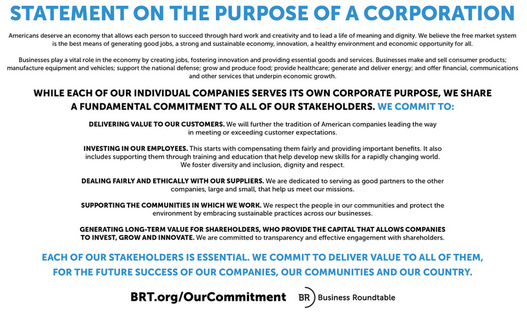
Stakeholder advocacy – cosplaying land grab or serious change to the purpose of a corporation?
The Business Roundtable changed its statement of “the purpose of a corporation” to chip away at the long-held notion that corporate decision-making should revolve around what is best for shareholders.
Effectively, the leaders of some of America’s biggest companies are trying to change capitalist horse mid-race while cannily moving the goalposts so that their performance and position are no longer solely judged on whether they will yield higher profits for shareholders but should take into account, “all stakeholders”—that is, employees, customers and society writ large.
‘Each of our stakeholders is essential,’ the new Business Roundtable statement says. ‘We commit to deliver value to all of them, for the future success of our companies, our communities and our country.’ For a long time, this prestigious advocacy group has influenced corporate governance standards worldwide as well as been a powerful voice in Washington for U.S. business interests. The Business Roundtable counts chief executives of numerous of the biggest global companies in its membership.
On the surface, representing all stakeholders appears to be a long overdue major philosophical shift for this association to make and also looks an eminently laudable change for business generally. However, despite the mood music of greater commitment to – for example – environmentalism, reducing exogenous costs and caring for what they deem to be the interests of wider society, this shift arguably really signals a significant power grab by executives at the expense of both shareholders and, arguably, the wider society they now claim to seek to protect. This new-found desire to be ‘executives of people’ protecting all ‘stakeholders’ rather than just be beholden to mere shareholders also has the additional benefit that it effectively makes big business CEOs much harder to question or dismiss. Or, at least, makes it much harder for shareholders to replace these board execs if results go awry, strategies tank, scandals hit or profits collapse.
Even if we ignore the rank hypocrisy of this new-found stakeholder advocacy - especially given past performance and scandals - of CEOs suddenly setting themselves a wider corporately socially responsible remit. Effectively these global and major corporation CEOs are in future really asking to be judged and rewarded upon measures chosen at their sole discretion. If rewards and longevity are granted based on examinations - with many shifting parts they selectively identify as the need suits them - that they then get to mark themselves, this is a long way short of a model of good corporate governance. There is, of course, a long tradition in Britain of Chairmen, CEOs and executive boards marking their own homework favourably.
Worse still, this new-found zeal to appeal to and protect all “stakeholders” simultaneously emasculates the current power and ability shareholders have (and, sometimes, effectively use) to hold boards, their strategies and the resulting business outcomes to better account. Understandably, shareholders with strategy doubts and remuneration queries can be a really annoying nuisance, not least because as they get under busy executives feet. As Bloomberg’s Matt Levine perceptively notes, ‘most disputes over corporate governance are… between shareholders and managers….[and] about whether shareholders or managers should have more power to control the corporation.’
Before we rush to embrace this so-called significant philosophical shift by major corporation CEOs and their powerful trade advocacy body, let’s pause our initial congratulation and, instead, reflect upon the possible long-term implications. Though protecting wider society from scandals and corporate excess is both urgent and necessary work, it is vital to remember that this soon to be adopted wider conception and loose definition of a “stakeholder” put forward by The Business Roundtable makes CEOs and boards both less fireable and accountable as well as less responsible for the outcomes of their business decisions and strategic actions. Worse still, it also ensures that this “stakeholder” audience remains badly constrained as - Levine notes, - ‘mostly tools in the shareholder/manager fight, not power centres in themselves.’ While corporate governance that is capricious, catastrophic or red-in-tooth-and-claw is already well past its sell by date, this new gift horse isn’t the solution to poor governance, corporate scandal or excess let alone likely to improve board decision-making. What is really best for stakeholders needs to represent a much wider constituency of interests, opinion and voices. Upon close examination this new Business Table horse isn’t the thoroughbred it pretends and can only be ridden badly in one direction so needs to get put out to pasture with its riders quickly.
Image credit: BRT.org/Forbes
